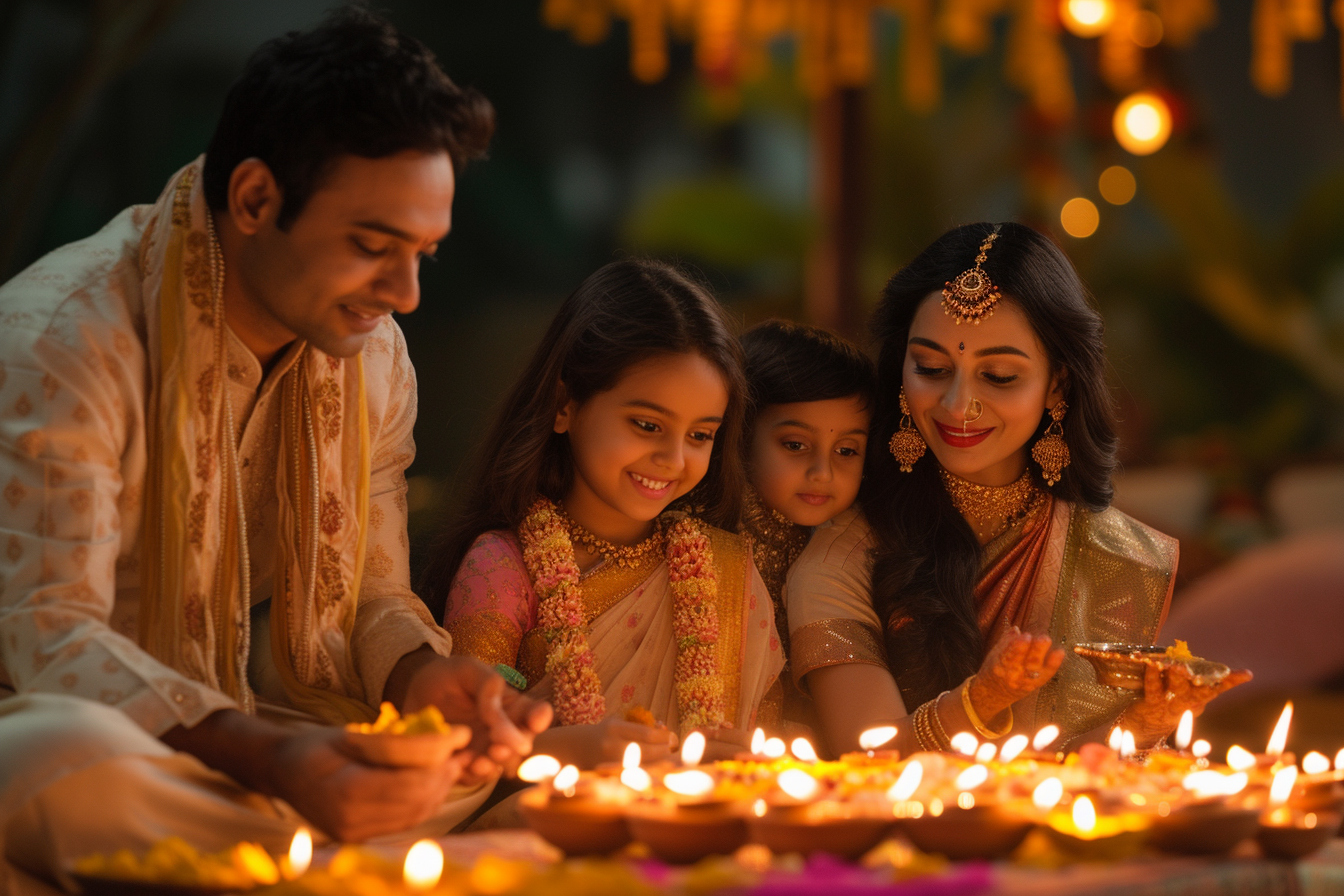Often referred to as the “Festival of Lights,” Diwali is a major holiday celebrated by millions of people across the world. Originating in India, this festive occasion symbolizes the spiritual “victory of light over darkness, good over evil, and knowledge over ignorance.” As you embark on an exploration of Diwali, expect to uncover a wealth of traditions, meanings, and celebratory practices that bind communities and resonate with themes of renewal, hope, and joy.
The significance of diwali

The mythological roots
Diwali finds its roots in numerous ancient Hindu scriptures. The most prevalent one relates to the legend of Lord Rama, his wife Sita, and brother Lakshmana returning home to Ayodhya after 14 years of exile and a fierce battle with the demon king Ravana. To honor their return, the people of Ayodhya lit rows of clay lamps, setting the template for modern-day celebrations.
Spiritual meanings
Spiritually, Diwali signifies the victory of light over darkness. It’s a time when followers seek blessings from the goddess of wealth, Lakshmi, and the god of wisdom, Ganesha. The festival’s connection to wealth and prosperity is deeply ingrained in the cultural fabric of Indian society, and many invoke these deities for good fortune in the coming year.
Timeless traditions of diwali
Illuminating homes and streets
Preparations for Diwali start days in advance, with households being cleaned thoroughly to welcome the goddess Lakshmi. Windows are opened, and lamps, called “diyas,” are lit to guide her into homes. These traditional oil lamps, along with modern electric lights, transform neighborhoods into glowing spectacles.
Rangolis: artistic floor patterns
Creating rangoli is another beloved Diwali custom. Artists use colored powders, rice, or flower petals to create intricate designs on the floors of homes and public spaces. These patterns are thought to bring good luck and typically include themes associated with nature and spirituality.
The exchange of gifts and sweets
A hallmark of Diwali is the exchange of gifts and sweets among friends and family. This gesture enhances community bonds and spreads goodwill. Traditional sweets, known as “mithai,” are prepared in vast quantities, showcasing the culinary diversity of Indian culture.
The culinary delights
Savoring traditional flavors
During Diwali, kitchens buzz with activity, as an array of traditional dishes is prepared. From savory snacks like samosas and chaklis to sweet treats such as gulab jamun and kheer, food plays a central role in the celebrations. These treats are not only consumed within the family but also shared with neighbors and visitors as a token of communal harmony.
Vegetarian feasts
A majority of Diwali celebrants observe vegetarianism during the festival, focusing on ingredients considered pure and auspicious. Grand vegetarian feasts are common, and it’s a time when many experiment with new recipes and flavors.
The festivities across five days
Day one: dhanteras
The festivities kick off with Dhanteras, a day dedicated to wealth and prosperity. It is customary for people to buy gold or new kitchenware as a sign of good luck for the year ahead. Markets bustle with activity, and the excitement for Diwali starts to build.
Day two: naraka chaturdashi
The second day, known as Naraka Chaturdashi, marks the defeat of the demon Narakasura. It’s a day of cleansing, with early morning rituals involving oil baths and prayers. Homes continue to be decorated, and excitement grows.
Day three: diwali
At the festival’s peak is the main day of Diwali. It’s when the most significant prayers, or “pujas,” to Lakshmi and Ganesha occur. Fireworks light up the sky, symbolizing the celebrations and the overarching theme of light triumphing over darkness.
Day four: annakut
On Annakut, the fourth day, a mountain of food is offered to the deities, representing gratitude and the bounty of the harvest. Many temples host feasts, and devotees relish the communal aspect of sharing food.
Day five: bhai dooj
Closing the festivities is Bhai Dooj, celebrating the bond between brothers and sisters. Siblings exchange gifts and wishes for each other’s well-being, reflecting the festival’s emphasis on familial ties and affection.
Modern interpretations and global impact
Diwali in the digital age
Technology has transformed the ways in which Diwali is celebrated. Greetings and well-wishes are now often sent through social media and messaging apps. In the spirit of innovation, eco-conscious individuals are adopting less polluting forms of celebration, such as using LED lights and avoiding firecrackers.
Embracing diversity
Diwali’s appeal extends far beyond its Indian origins. Communities around the globe embrace this vibrant festival, often incorporating their own customs into the celebration. Public displays of lights, cultural programs, and community gatherings are indicative of a festival that transcends borders, with inclusivity at its heart.
Diwali’S socio-economic dimensions
Festival’S economic impact
The lead-up to Diwali sees a surge in commercial activity, with businesses offering sales and promotions. It’s a period of significant economic importance in many countries, from small family-run shops to large corporations.
Strengthening community ties
Diwali’s emphasis on generosity and kindness serves to strengthen bonds within communities. Charity drives and volunteer activities are common, allowing the joy of the festival to reach those less fortunate.
A celebration for self-improvement
Fostering self-awareness
While the external festivities of Diwali are visually and culturally rich, a subtle aspect of the celebration is the focus on personal betterment. Individuals reflect on their lives, make resolutions, and consider ways to eliminate personal darkness, akin to the larger theme of the festival.
Promoting universal values
Though rooted in Hinduism, Diwali’s essence promotes universal values of love, forgiveness, and enlightenment. Its message of light conquering darkness offers a hopeful perspective that resonates with people from myriad backgrounds.
In delving into the depths of Diwali, one discovers a festival that is multi-faceted and dynamic. It encapsulates an incredible blend of historical traditions, spiritual beliefs, social practices, and modern adaptations. With its dazzling array of lights, the embrace of community and family, and the joy that permeates the air, Diwali stands as a testament to the power of collective celebration in illuminating the human spirit.


Leave a Reply